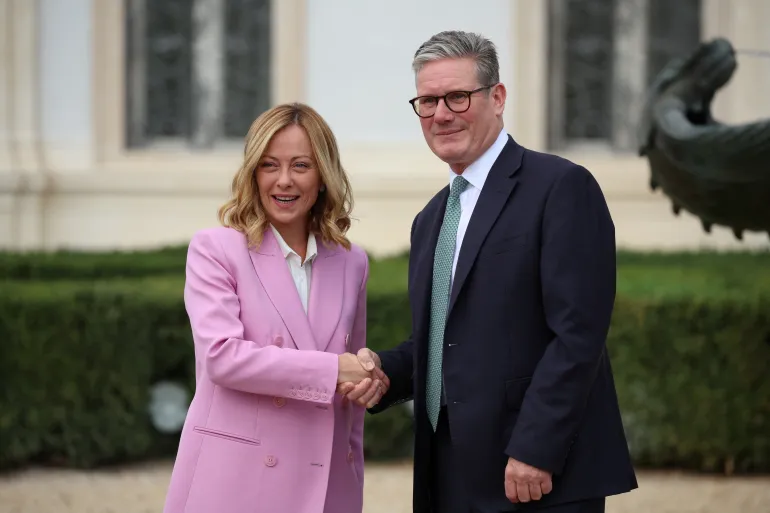British Prime Minister Keir Starmer met with Italy’s Prime Minister Giorgia Meloni in Rome on Monday. The two leaders discussed ways to tackle irregular immigration, a major issue for both countries. Starmer’s visit to Italy is part of his broader effort to address the growing concern over illegal migration to the United Kingdom.
Understanding Italy’s Reduction in Migrants
Starmer’s primary goal in meeting Meloni was to understand how Italy has dramatically reduced the number of migrants arriving by sea. Italy, which has long dealt with a large influx of migrants from North Africa. It has recently seen a sharp drop in arrivals. The UK Prime Minister was interested in learning from Italy’s experience.
Starmer also toured a national immigration coordination centre in Italy. The centre is responsible for managing migration and enforcing Italy’s immigration laws. During his visit, he highlighted the importance of prevention as a strategy to stop irregular migration.
Backlash from Labour Party Members
Starmer’s visit to Italy has sparked criticism from some members of his own party. Meloni, leads the far-right Brothers of Italy party. She is known for her hardline anti-immigration stance. Concerned over Starmer’s meeting, Labour MP Kim Johnson described it as “disturbing” to see the Labour leader taking lessons from a “neo-fascist government.”
Johnson’s comments came in the wake of far-right riots in the UK. During which mosques and migrant centres were attacked. Many within Labour have voiced concerns about the party’s shift toward stricter immigration policies. They are worried that it might alienate progressive voters.
Immigration: A Perilous Issue for the UK
Migration continues to be a contentious issue in the UK, with thousands of undocumented migrants attempting to reach Britain each year. Many make the dangerous journey across the English Channel in small boats from France.
So far this year, more than 22,000 people have attempted the crossing, with dozens tragically losing their lives. On Saturday, eight people died when their boat ran aground. That same day, 14 boats carrying 801 people made it to Britain.
Fighting Criminal Gangs
Despite the criticism, British Home Secretary Yvette Cooper defended the decision to seek advice from Italy. She argued that the UK has a “moral imperative” to combat the criminal gangs responsible for smuggling people across the Channel. According to Cooper, these gangs are endangering lives by encouraging people to undertake the perilous journey.
Although Starmer has rejected the Conservative government’s plan to send asylum seekers to Rwanda, he has not ruled out the possibility of processing asylum claims offshore.
Italy’s Approach to Migration
Italy has taken several steps to reduce the number of migrants arriving by sea. In November, Italy reached an agreement with Albania to host two centres where asylum seekers would be processed. Those whose asylum claims are rejected would be sent back to their home countries, while successful applicants would be granted entry to Italy.
Italy has also signed a deal with Tunisia, offering financial aid in return for stronger efforts to stop refugees from crossing the Mediterranean. In addition, Italy renewed a controversial agreement with Libya to fund its coastguard. Under this deal, migrants intercepted at sea are returned to Libya, a policy that has been widely criticised by human rights groups for subjecting refugees to abuse and torture.
Lower Migrant Arrivals in Italy
The number of migrants arriving in Italy by sea has significantly decreased from the year’s beginning. 44,675 persons came in Italy between January 1 and September 13, 2023, as opposed to 125,806 over the same time in 2023. Meloni credits this reduction to Italy’s agreements with Tunisia and Libya.
Starmer noted that Italy’s success seemed to stem from working with countries where migrants originate. He emphasised the importance of addressing the issue at its root by preventing people from making the journey in the first place.
Moving Forward
As migration remains a hot topic in both the UK and Italy, Starmer’s visit underscores the ongoing search for effective solutions. While his meeting with Meloni has raised eyebrows within his own party, Starmer appears determined to explore a range of strategies to tackle the issue. How these policies evolve in the coming months will shape both nations’ approaches to immigration.

